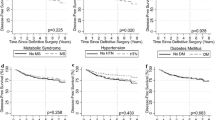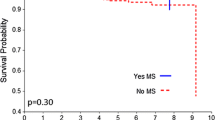Abstract
Metabolic syndrome, a conglomerate of obesity, insulin resistance, dyslipidemia, and hypertension has been linked with an increased risk of breast cancer. We investigated the possible association of highly aggressive triple-negative breast cancer and the metabolic syndrome. Information on metabolic syndrome components and tumor characteristics were reviewed in a cohort of 176 patients (including 86 triple-negatives). Retrospective comparison was performed using Pearson Chi-square test or Student’s t test for data analysis. A statistically significant association of triple-negative breast cancer with the metabolic syndrome was observed. In accordance with the NCEP (National Cholesterol Education Program) definition, 58.1% of triple-negative patients had metabolic syndrome compared to only 36.7% of non-triple-negative patients (P = 0.004). Consistently, by the AACE (American Association of Clinical Endocrinologists) criteria, 52.3% of triple-negative patients had metabolic syndrome as compared to 34.4% of non-triple-negative patients (P = 0.017). Blood glucose, triglyceride, and HDL levels but not hypertension or BMI (body mass index) showed significant independent association with triple-negative breast cancer. Additionally, triple-negative tumors displayed a significantly higher histological grade and relative paucity of ductal carcinoma in situ (DCIS) when compared to the non-triple-negative tumors (P < 0.001). Our study suggests that metabolic syndrome is significantly more prevalent in triple-negative breast cancer patients as opposed to non-triple-negative patients. Furthermore, triple-negative breast cancer showed a significantly higher histological grade and a relative absence of DCIS. Whether the presence of metabolic syndrome preferentially increases the risk of developing triple-negative-breast cancer remains to be elucidated with future prospective studies.
Similar content being viewed by others
References
Anders C, Carey LA (2008) Understanding, treating triple-negative breast cancer. Oncology (Williston Park) 22(11):1233–1239 discussion 1239–1240, 1243
Rakha EA, Ellis IO (2009) Triple-negative/basal-like breast cancer: review. Pathology 41(1):40–47
Schneider BP, Winer EP, Foulkes WD et al (2008) Triple-negative breast cancer: risk factors to potential targets. Clin Cancer Res 14(24):8010–8018
Irvin WJ Jr, Carey LA (2008) What is triple-negative breast cancer? Eur J Cancer 44(18):2799–2805
Millikan RC, Newman B, Tse CK et al (2008) Epidemiology of basal-like breast cancer. Breast Cancer Res Treat 109(1):123–139
Vona-Davis L, Howard-McNatt M, Rose DP (2007) Adiposity, type 2 diabetes and the metabolic syndrome in breast cancer. Obes Rev 8(5):395–408
Giovannucci E (2007) Metabolic syndrome, hyperinsulinemia, and colon cancer: a review. Am J Clin Nutr 86(3):s836–s842
Rose DP, Haffner SM, Baillargeon J (2007) Adiposity, the metabolic syndrome, and breast cancer in African-American and white American women. Endocr Rev 28(7):763–777
Beebe-Dimmer JL, Nock NL, Neslund-Dudas C (2009) Racial differences in risk of prostate cancer associated with metabolic syndrome. Urology 74(1):185–190
Hsing AW, Sakoda LC, Chua S Jr (2007) Obesity, metabolic syndrome, and prostate cancer. Am J Clin Nutr 86(3):s843–s857
Kaaks R, Berrino F, Key T et al (2005) Serum sex steroids in premenopausal women and breast cancer risk within the European Prospective Investigation into Cancer and Nutrition (EPIC). J Natl Cancer Inst 97:755–765
Helzlsouer KJ, Alberg AJ, Bush TL et al (1994) A prospective study of endogenous hormones and breast cancer. Cancer Detect Prev 18:79–85
Kabuto M, Akiba S, Stevens RG, Neriishi K, Land CE (2000) A prospective study of estradiol and breast cancer in Japanese women. Cancer Epidemiol Biomarkers Prev 9:575–579
Wysowski DK, Comstock GW, Helsing KJ, Lau HL (1987) Sex hormone levels in serum in relation to the development of breast cancer. Am J Epidemiol 125:791–799
Eliassen AH, Missmer SA, Tworoger SS, Hankinson SE (2006) Endogenous steroid hormone concentrations and risk of breast cancer: does the association vary by a woman’s predicted breast cancer risk? J Clin Oncol 24:1823–1830
Rosenberg CR, Pasternack BS, Shore RE, Koenig KL, Toniolo PG (1994) Premenopausal estradiol levels and the risk of breast cancer: a new method of controlling for day of the menstrual cycle. Am J Epidemiol 140:518–525
Meigs J (2006) Metabolic syndrome and the risk for type 2 diabetes. Expert Rev Endocrin Metab 1:57, table 1
Murthy NS, Mukherjee S, Ray G et al (2009) Dietary factors and cancer chemoprevention: an overview of obesity-related malignancies. J Postgrad Med 55(1):45–54
Jardé T, Caldefie-Chézet F, Goncalves-Mendes N et al (2009) Involvement of adiponectin and leptin in breast cancer: clinical and in vitro studies. Endocr Relat Cancer (Epub ahead of print)
Werner H, Bruchim I (2009) The insulin-like growth factor-I receptor as an oncogene. Arch Physiol Biochem 115(2):58–71
Arai Y, Kojima T, Takayama M et al (2009) The metabolic syndrome, IGF-1, and insulin action. Mol Cell Endocrinol 299(1):124–128
Roberts CK, Sindhu KK (2009) Oxidative stress and metabolic syndrome. Life Sci 84(21–22):705–712
Halmos T, Suba I (2008) The metabolic syndrome and type-2 diabetes mellitus as conditions predisposing for malignant tumors. Orv Hetil 149(51):2403–2411
Andre F, Dessen P, Job BS et al (2009) Functional pathways analyses to identify candidate therapeutic targets in triple-negative breast cancer. J Clin Oncol 27:15s (suppl; abstr 569)
Walter O, Prasad M, Lu S et al (2009) IMP3 is a novel biomarker for triple negative invasive mammary carcinoma associated with a more aggressive phenotype. Hum Pathol (Epub ahead of print)
Yamamoto Y, Ibusuki M, Nakano M et al (2009) Clinical significance of basal-like subtype in triple-negative breast cancer. Breast Cancer 16(4):260–267
Author information
Authors and Affiliations
Corresponding author
Rights and permissions
About this article
Cite this article
Maiti, B., Kundranda, M.N., Spiro, T.P. et al. The association of metabolic syndrome with triple-negative breast cancer. Breast Cancer Res Treat 121, 479–483 (2010). https://doi.org/10.1007/s10549-009-0591-y
Received:
Accepted:
Published:
Issue Date:
DOI: https://doi.org/10.1007/s10549-009-0591-y




